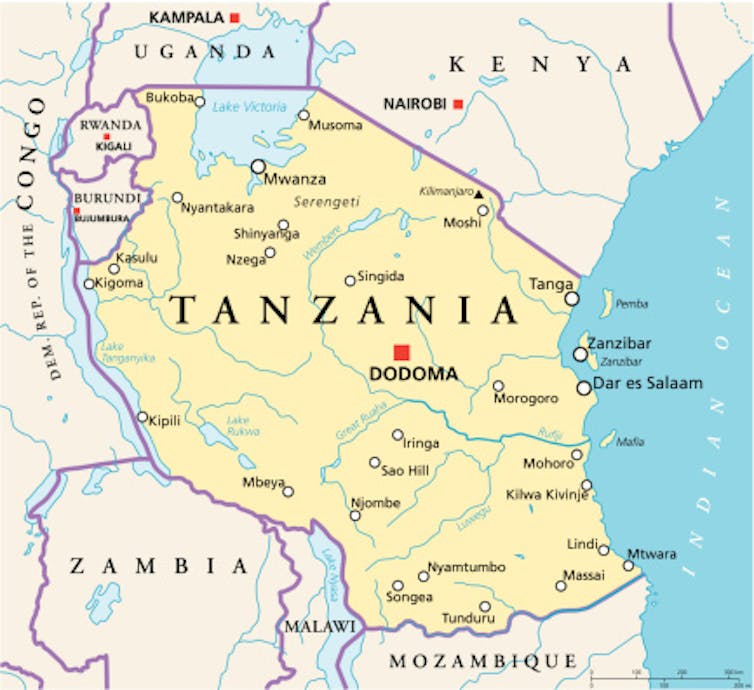Zanzibar’s semi-autonomous status within Tanzania poses a fascinating blend of unity and division in their political landscape. Did you know Zanzibar has its own President, House of Representatives, and legal system, despite being part of Tanzania? This unique arrangement highlights the complexities and nuances in their political relationship, which continues to evolve.
The union of Tanganyika and Zanzibar in 1964 resulted in the formation of Tanzania, a move driven by strategic, economic, and political considerations. Zanzibar retained substantial autonomy, particularly in terms of its internal policies and legal matters. Interestingly, the 2020 General Elections saw an 88% voter turnout in Zanzibar, underscoring the island’s vibrant political engagement within the union.

Historical Context of Tanzania-Zanzibar Political Relationship
The union between Tanganyika and Zanzibar was formed in 1964. Before this, both were separate entities with their own governance. Tanganyika gained independence in 1961, while Zanzibar achieved the same in 1963. This unification led to the creation of the United Republic of Tanzania. The integration of the two regions was motivated by the desire to strengthen political and economic stability.
Zanzibar was granted significant autonomy following the union. Despite being part of Tanzania, Zanzibar retained its own President and legislative body. This unique arrangement allowed for local governance with greater flexibility. According to this post, this system helped manage diverse cultural and political interests. The autonomy was essential for addressing the needs specific to Zanzibar.
The semi-autonomous status of Zanzibar has not been without challenges. There have been political tensions and calls for more independence from Zanzibar over the years. Some leaders have pushed for a greater degree of separation. Here is the article that mentions Zanzibar’s unique legal jurisdiction. Despite these tensions, the union has remained intact, adapting to changing political dynamics.
In recent years, there have been renewed efforts to strengthen the union. This includes addressing underlying issues and fostering better cooperation. Both regions continue to navigate their political relationship with a focus on mutual benefits. The historical context helps understand the complexities and opportunities within the Tanzania-Zanzibar political relationship. Efforts to maintain the partnership is a testament to the resilience of both parties.
The Formation of the Union in 1964
The union between Tanganyika and Zanzibar in 1964 marked a significant moment in East African history. Tanganyika achieved independence from British rule in 1961. Just a couple of years later, Zanzibar followed suit, gaining its own independence in 1963. The two regions saw the benefits of unity and decided to merge. This merger led to the establishment of the United Republic of Tanzania.
The formation of this union was not just a political maneuver. It was driven by several mutual interests and benefits. Both regions aimed to enhance their political stability and economic growth. They saw unity as a way to consolidate their resources and influence. This sense of common purpose guided their decision to unify.
The agreement to form the union included some unique conditions. Zanzibar retained a lot of its autonomy and had its own President and legislature. This semi-autonomous status was crucial for managing local affairs. However, Zanzibar also participated in the national government. This way, both places benefited from being part of a larger entity while maintaining some independence.
Surprisingly, the formation of the union was quick and relatively smooth. Within days of the initial agreement, formal documents were signed. Public support played a significant role in this process. People from both regions generally supported the idea of unity. The union showed that distinct regions with their histories and cultures could come together for a broader goal.
Semi-autonomous Status of Zanzibar
Zanzibar’s semi-autonomous status within Tanzania is a unique feature of this union. Although Zanzibar is part of Tanzania, it operates with significant independence. This autonomy allows Zanzibar to maintain its own President and legislative body. This arrangement helps address local needs effectively. Many local laws and policies are tailored to fit Zanzibar’s specific cultural and social landscape.
This semi-autonomous status also allows Zanzibar to manage its internal affairs. One key area where this autonomy is evident is in legal jurisdictions. Zanzibar has its legal system separate from mainland Tanzania. This legal independence ensures that the island can handle issues according to its unique needs. Having a tailored legal system provides more relevant and effective governance.
The arrangement includes participation in the national government. Zanzibar sends representatives to the Parliament of Tanzania. This means that while having its own governance, Zanzibar also has a voice in the national arena. This dual involvement helps balance local needs with national interests. It creates a platform for integration and unity at different levels.
There are advantages and challenges to this semi-autonomous status. On the positive side, it allows for addressing specific local issues efficiently. However, it can also lead to political tensions and calls for more independence. Striking a balance between autonomy and union is essential. This ongoing process is what shapes the distinctive political relationship of Tanzania and Zanzibar.
Impact of Political Alignment on Local Governance
Political alignment between Zanzibar and mainland Tanzania significantly influences local governance. When the two regions have leaders from the same political party, collaboration tends to be smoother. This alignment can lead to more cohesive policy implementation. It also often results in increased funding and support for local projects. Shared political goals strengthen unity in governance.
Differences in political alignment, however, can pose several challenges. When leaders in Zanzibar and the mainland come from opposing parties, tensions can rise. Disagreements may lead to delays in policy implementation or funding allocations. These conflicts can affect the efficiency and effectiveness of local governance. People living in Zanzibar might feel the impact of these political disagreements in their daily lives.
Political alignment affects public services in Zanzibar. When the central government and Zanzibar’s leaders work together, services like healthcare and education are better coordinated. This cooperation improves overall service delivery. When they don’t align, essential services may suffer. Disagreements can slow down or block important projects.
Economic initiatives are also influenced by political alignment. Joint efforts can lead to better economic policies and investments. A good relationship between the mainland and Zanzibar can attract more foreign direct investments. This economic boost benefits local businesses and communities. Conversely, misalignment can lead to missed opportunities and economic stagnation.
Cultural and social programs can prosper with the right political alignment. Shared initiatives in areas like tourism can benefit both regions. For example, promoting Tanzania safari and [Kilimanjaro climbing](https://www.lappetfacedsafaris.com/kilimanjaro-climbing/) as joint attractions can enhance tourist experiences. This cooperation fosters a sense of national pride and cultural unity.
Overall, alignment or misalignment in political views plays a crucial role. It can either streamline governance processes or create roadblocks. The political relationship between Zanzibar and mainland Tanzania continues to evolve. Leaders must navigate these dynamics for the greater good. Finding common ground remains essential for the stability and prosperity of both regions.
Current Political Structure and Governance
The political structure of Tanzania includes both a central government and a semi-autonomous government in Zanzibar. The central government of Tanzania is led by a President who oversees the entire nation. Below the President is a Vice President, Prime Minister, and various ministers. This government handles national issues like defense, foreign policy, and immigration. Mainland Tanzania is divided into multiple regions, each with its own local government.
Zanzibar has its own separate executive authority. The President of Zanzibar is the head of the Zanzibar Government. This government has a similar structure to the central government, with its own ministers and administrative bodies. Zanzibar manages its internal affairs, including education, health, and local law. The semi-autonomous status allows Zanzibar a level of self-governance within Tanzania.
The legislative power in Tanzania is vested in a bicameral Parliament. The National Assembly consists of elected members from both mainland Tanzania and Zanzibar. Members work on national legislation and policies. Zanzibar also has its own legislature called the House of Representatives. This body handles local legislative matters, reflecting the region’s autonomy.
Judicial power in Tanzania is held by the judiciary, which includes various courts. The judiciary operates independently from the legislative and executive branches. Zanzibar has its own High Court and other lower courts. These courts focus on legal issues specific to Zanzibar. The legal systems in mainland Tanzania and Zanzibar work both independently and together on certain matters.
Local governance in Tanzania includes multiple levels, from regional to district councils. These councils address local needs and services. Coordination between local and national governments is crucial for effective governance. Zanzibar’s local government bodies work similarly, providing essential services to the community. This structure ensures that both national and regional concerns are addressed effectively.
Overall, the current political structure of Tanzania and Zanzibar is a blend of unity and autonomy. While both regions are part of one nation, Zanzibar enjoys significant self-governance. This arrangement allows for a balance between national unity and local autonomy. It also helps manage the unique needs of different regions. This complex but balanced political structure continues to evolve, aiming for efficiency and stability.
Challenges and Opportunities in the Tanzania-Zanzibar Relationship
The Tanzania-Zanzibar relationship faces numerous challenges that impact both regions. One such challenge is managing the political tensions that arise from differences in governance. Disagreements on policy implementation can lead to delays in development projects. Economic disparities between the mainland and Zanzibar also contribute to misunderstandings. These issues need careful management to prevent conflicts.
Another challenge is ensuring equal representation in national matters. Sometimes, Zanzibar feels its needs are not fully considered in national policies. This can lead to feelings of neglect and calls for more autonomy. On the other hand, the mainland wants to ensure national unity and stability. Balancing these concerns requires thoughtful negotiation.
Despite the challenges, there are significant opportunities in this relationship. Economic cooperation can lead to mutual growth. Joint development projects and investments can benefit both regions. For example, promoting tourism together, such as Tanzania safari and [Kilimanjaro Climbing](https://www.lappetfacedsafaris.com/kilimanjaro-climbing/), can attract more international visitors. More tourists mean more jobs and income for local communities.
There are also opportunities for cultural exchange and collaboration. Both regions have rich histories and traditions. Promoting cultural events and festivals can strengthen the bond between the mainland and Zanzibar. Such initiatives foster a sense of unity and shared identity. They also showcase the diversity and richness of Tanzanian culture to the world.
Furthermore, improvements in infrastructure can be a shared goal. Developing roads, ports, and communication networks benefits the entire nation. Better infrastructure facilitates trade and travel, making life easier for citizens. Investments in infrastructure enhance connectivity and economic development. Collaboration in these areas can lead to substantial benefits.
In essence, the relationship between Tanzania and Zanzibar is complex but full of potential. Addressing challenges requires cooperation and understanding. Focusing on opportunities can lead to mutual growth and prosperity. Both regions have much to gain from their continued partnership. With effective management, this relationship can serve as a model for unity and development.
Key Takeaways
- Zanzibar and Tanzania formed a union in 1964.
- Zanzibar retains significant autonomy with its own President and legal system.
- The relationship balances local governance with national participation.
- Political alignment impacts policy implementation and public services.
- Shared goals can lead to mutual economic and cultural benefits.

